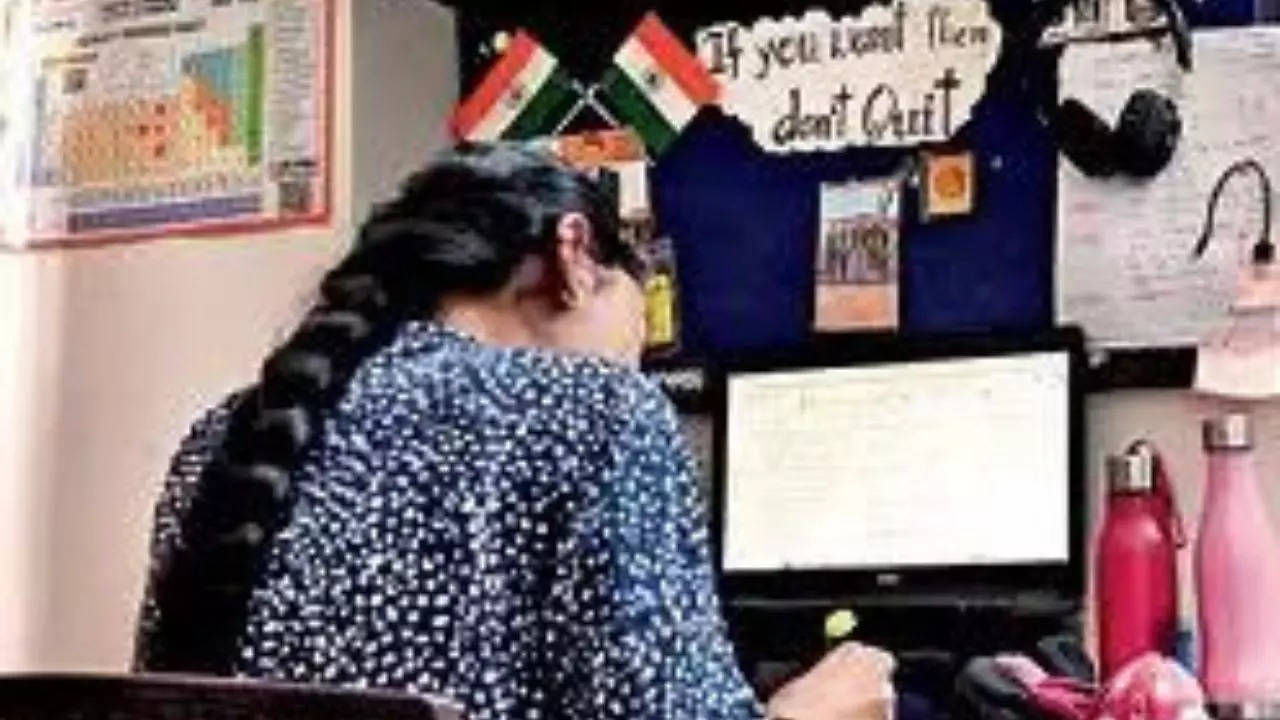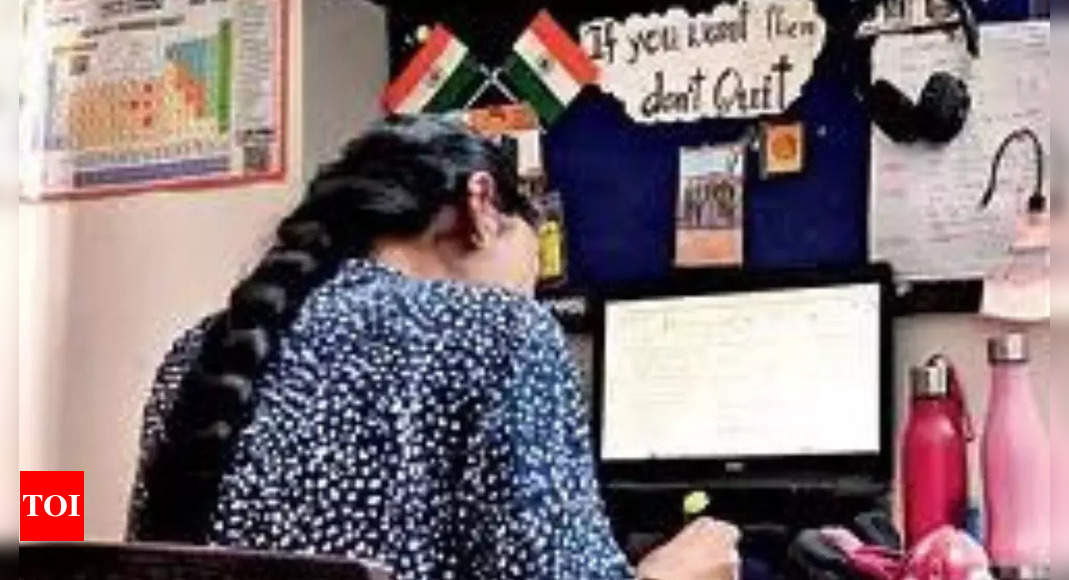
Steps like spring-loaded fans and nets can only go so far. Some non-profits, police and counsellors are focusing on prevention instead
A fortnight ago, a 17-year-old student living in a paying guest accommodation in Rajasthan’s Kota had locked herself up in her room and refused to open when the landlord went to check on her. She had missed dinner that night, which raised suspicion. It took a call to Hope Society and an hour-long intervention by one of the counsellors to finally convince her to step out.
“People look at the number of students who died by suicide, no one looks at the number of children who have been saved,” says Dr M L Agrawal, a Kota-based psychiatrist who set up Hope Society, an NGO providing mental health counselling to students in the city. Recently, a NEET aspirant from Uttar Pradesh died by suicide, taking the number of such cases to 26 in 2023.
This is not a new problem for this city and every time the issue hits national headlines, the local administration takes steps like installing spring-loaded fans or nets in balconies of hostels to prevent suicides. However, there are people and organisations who believe the answer lies in the good old method of mental health counselling. For instance, Hope Society operates in two ways — a student can either call the helpline or visit the clinic in person. The organisation says it has helped 11,500 students so far in various ways.
The team registers details of all calls and decides the level of intervention based on the gravity of the problem. In some cases, the team has found underlying psychiatric ailments in students like bipolar disorder and schizophrenia. “Such students when left on their own become a lot more vulnerable to the pressures of Kota,” says Dr Agrawal. He suggests that all coaching institutes should do a mental health screening before admitting students. In June this year, the Kota police also sprang into action to start a student cell which provides mental health counselling to students and identifies students displaying signs of depression.
Thakur Chandrasheel Kumar, in charge of the cell, says his team, which comprises police officers dressed in plain clothes, speaks to students in friendly settings like a cafe, or a tea stall on a regular basis to understand the challenges they face. If they find that a student is showing signs of depression, they refer him/her to the counsellor. “When youngsters come so far away from home and are studying more than 16 hours a day, lack of good accommodation and food also takes a toll,” says a counsellor who works for the student cell.
There are also private counsellors in Kota, but they complain that they usually do not get active support from the coaching institutions when it comes to mental health counselling. Some allege that coaching institutes ask them to not mention the word suicide anywhere in their posters or their lectures to students. The Tata Institute of Social Sciences (TISS) had also tried to provide mental health services to students in Kota a few years ago, but the project came to an end due to various reasons including financial ones.
“Support system is very minimal there and mental health intervention has to be integrated with coaching,” says Aparna Joshi, assistant professor school of human ecology at TISS who was a part of the project. In a response to TOI’s queries on efforts for student counselling, Allen Coaching institute, one of the largest institutes in Kota, said that they “organise regular counselling sessions, parent-teacher meetings, sessions on alternate career options as well as motivational and psychological counselling”.
They added that during the sessions, parents are also educated on dealing with psychological issues of their kids. They further added that they recognise the importance of a collaborative approach to student well-being and value the expertise that NGOs and external counsellors bring to the table. Despite such efforts, some students say they have no spare time to engage for therapy. Karan Singh, a 17-year-old from Rajasthan’s Jhunjhunu who has been studying in Kota for the last one year, told TOI that his schedule was completely packed with studies and revision, allowing hardly any time for other activities. “Coaching centres think that things like counselling are a waste of time,” he says
A fortnight ago, a 17-year-old student living in a paying guest accommodation in Rajasthan’s Kota had locked herself up in her room and refused to open when the landlord went to check on her. She had missed dinner that night, which raised suspicion. It took a call to Hope Society and an hour-long intervention by one of the counsellors to finally convince her to step out.
“People look at the number of students who died by suicide, no one looks at the number of children who have been saved,” says Dr M L Agrawal, a Kota-based psychiatrist who set up Hope Society, an NGO providing mental health counselling to students in the city. Recently, a NEET aspirant from Uttar Pradesh died by suicide, taking the number of such cases to 26 in 2023.
This is not a new problem for this city and every time the issue hits national headlines, the local administration takes steps like installing spring-loaded fans or nets in balconies of hostels to prevent suicides. However, there are people and organisations who believe the answer lies in the good old method of mental health counselling. For instance, Hope Society operates in two ways — a student can either call the helpline or visit the clinic in person. The organisation says it has helped 11,500 students so far in various ways.
The team registers details of all calls and decides the level of intervention based on the gravity of the problem. In some cases, the team has found underlying psychiatric ailments in students like bipolar disorder and schizophrenia. “Such students when left on their own become a lot more vulnerable to the pressures of Kota,” says Dr Agrawal. He suggests that all coaching institutes should do a mental health screening before admitting students. In June this year, the Kota police also sprang into action to start a student cell which provides mental health counselling to students and identifies students displaying signs of depression.
Thakur Chandrasheel Kumar, in charge of the cell, says his team, which comprises police officers dressed in plain clothes, speaks to students in friendly settings like a cafe, or a tea stall on a regular basis to understand the challenges they face. If they find that a student is showing signs of depression, they refer him/her to the counsellor. “When youngsters come so far away from home and are studying more than 16 hours a day, lack of good accommodation and food also takes a toll,” says a counsellor who works for the student cell.
There are also private counsellors in Kota, but they complain that they usually do not get active support from the coaching institutions when it comes to mental health counselling. Some allege that coaching institutes ask them to not mention the word suicide anywhere in their posters or their lectures to students. The Tata Institute of Social Sciences (TISS) had also tried to provide mental health services to students in Kota a few years ago, but the project came to an end due to various reasons including financial ones.
“Support system is very minimal there and mental health intervention has to be integrated with coaching,” says Aparna Joshi, assistant professor school of human ecology at TISS who was a part of the project. In a response to TOI’s queries on efforts for student counselling, Allen Coaching institute, one of the largest institutes in Kota, said that they “organise regular counselling sessions, parent-teacher meetings, sessions on alternate career options as well as motivational and psychological counselling”.
They added that during the sessions, parents are also educated on dealing with psychological issues of their kids. They further added that they recognise the importance of a collaborative approach to student well-being and value the expertise that NGOs and external counsellors bring to the table. Despite such efforts, some students say they have no spare time to engage for therapy. Karan Singh, a 17-year-old from Rajasthan’s Jhunjhunu who has been studying in Kota for the last one year, told TOI that his schedule was completely packed with studies and revision, allowing hardly any time for other activities. “Coaching centres think that things like counselling are a waste of time,” he says
Source link

